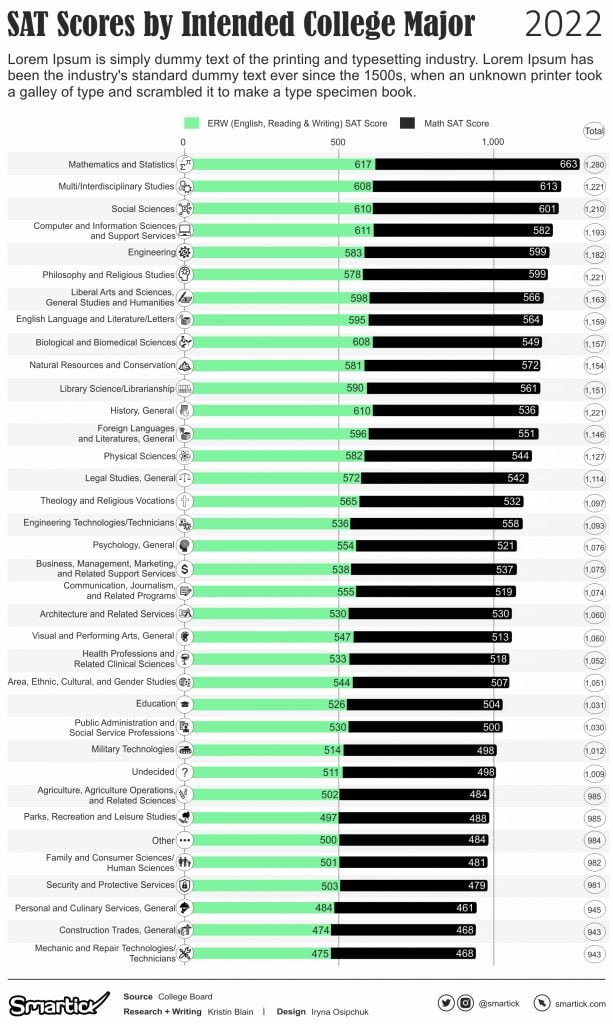
Navigating one’s postsecondary path can be daunting for any high school senior, but college entrance exams can offer many uncertain students the reassurance they need when deciding on their academic future.

The Scholastic Assessment Test, or more commonly known as the SAT, is an entrance exam used by U.S. colleges and universities for making admissions decisions. Historically, the higher a student scores on their entrance exams, the more options they will have for attending (and paying for) college.
Standardized testing alone cannot reliably measure overall academic ability, but college entrance exam scores do offer a valuable snapshot of discipline and studiousness—important qualities for students making decisions about their intended majors.
In 2022, the College Board compiled student’s SAT scores into a table showing how different prospective majors performed in the subjects of Evidence-based Reading and Writing (ERW) and Math. According to the data in this report, the higher a student scored, the higher the likelihood that they’d choose a more cognitively-demanding and discipline-oriented college major.
This is especially evident for high school students propelling themselves towards a college major in Science, Technology, Engineering, or Mathematics (STEM). With majors in these fields, entering college with a solid math report card can lead to big wins.
Let’s examine some of the top intended STEM majors:
Mathematics and Statistics
It should come as no surprise that the highest scores were achieved by students intending to major in Mathematics and Statistics. Such an intellectually-challenging field of study requires the most disciplined of students; certainly those who also invest the greatest amount of time for exam preparation.
A Mathematics and Statistics major is designed to provide students with rigorous training in the methods, mathematical foundations, and applications of Statistics. They study systems based on numbers—from airline flight schedules and interest rates on home loans to political polls or public funding for a neighborhood park.
Students graduating with a degree in Mathematics and Statistics can expect to find work as actuaries assessing company risks to minimize financial costs; or as statisticians designing surveys, interpreting, and processing data for political, social, and governmental agencies.
Interdisciplinary Studies/Social Sciences
The next top-notch scores on the SATs belonged to students intending to major in Multi/Interdisciplinary Studies or Social Sciences. These fields are often connected to any combination of studies—from business and economics to political science and psychology.
While these fields might not directly correlate with the study of Mathematics, many students entering these majors will often need a strong foundation in Statistics and even Calculus to support their chosen fields’ applications of data collection and analysis.
Students graduating in Multi/Interdisciplinary Studies or Social Sciences can expect to choose from a wide range of potential careers: from public health administrators or public relations specialists to data analysts or forensic science technicians.
Computer and Information Sciences and Support Services
Scoring 54 points above the benchmark in SAT Mathematics, students choosing to major in Computer and Information Science and Support Services, or CIS, also show a high proficiency in math concepts and application.
With an intended major that focuses on computer theory and the design of computer systems and user interfaces from a scientific perspective, an advanced understanding of math will surely come in handy.
Students majoring in CIS might be interested in careers involving artificial intelligence and robotics, web design, information technology, or designing, programming, and testing software.
Engineering
The field of Engineering mainly entails the design and creation of machines and systems. It can be described as the application of mathematical and scientific principles to solve problems. Understandably, prospective Engineering students work hard to make sure their math scores accurately reflect their passion for entering this field.
Achieving an Engineering degree is no easy task. Successful Engineering majors must come equipped with a robust foundation in Mathematics and Science with a strong work ethic to further tackle challenging curriculum.
Students with degrees in Engineering might graduate to work in planning and maintaining public infrastructure, developing and manufacturing pharmaceuticals, designing cars, trains, and airplanes—or even refining the systems and processes for producing them.
Natural Resources and Conservation
Students intending to major in Natural Resources and Conservation also excelled on the SATs. In this program of study, students actively use their math skills for their coursework such as in quantitative analysis and assessment and natural resource sampling. Business and computer science courses are also commonly required, as they equip these majors with the skills they will need for reviewing conservation proposals and analyzing their possibilities.
A bachelor’s degree in Natural Resources and Conservation will open up opportunities for students to play an active role in protecting and managing the earth’s natural environments.
Career options include environmental technicians, natural resources engineers, environmental consultants, and environmental policy analysts.
Biological and Biomedical Sciences
Biological and Biomedical Sciences, or BBS, is an area of study that examines life in all its complexity and diversity—from ecology and the environment to genetics and molecular functioning.
Students intending to major in BBS should have a solid understanding of math including Statistics and Probability. BBS is an increasingly-popular field of study, so coming prepared with high math scores gives many prospective students a much-needed proverbial foot in the door, and excelling on the Math portion of the SATs certainly doesn’t hurt!
This field of study offers some of the most lucrative career options such as neuroscientists, pharmaceutical engineers, genetic engineers, and microbiologists.
Standardized Exams and STEM Majors
As many colleges rethink their use of standardized entrance exams in their admissions processes, students are still signing up to take them. Keeping SAT scores as a part of their college entrance portfolios offers yet another facet of a student’s academic integrity and might give them the extra boost they need to enter their preferred field of study—especially if that field of study is a STEM major.

